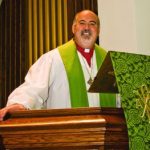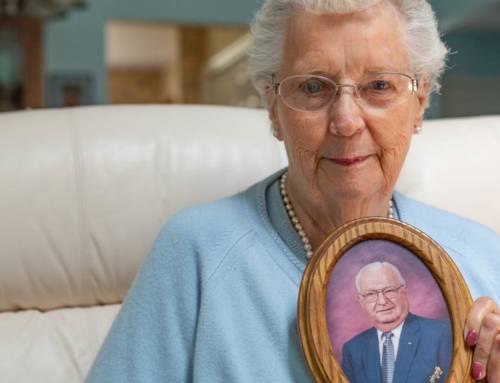
About the Author: Sunday Sermons from Sell Chapel are written by Rev. Preston Van Deursen, Director of Pastoral Care at the Masonic Village at Elizabethtown.
There are two birds that fly over our nation’s deserts: One is the hummingbird and the other is the vulture. The vultures find the rotting meat of the desert, because that is what they look for. They thrive on that diet. But hummingbirds ignore the smelly flesh of dead animals. Instead, they look for the colorful blossoms of desert plants. The vultures live on what was. They live on the past. They fill themselves with what is dead and gone. But hummingbirds live on what is. They seek new life. They fill themselves with freshness and life. Each bird finds what it is looking for. We all do.
Be very careful, then, how you live. In the verses of Ephesians that we have been reading the last few weeks, there is eternal wisdom for improving the quality of our character, the quest for life, the feeding of our soul. To put it out there in straight terms, if we follow this advice from Saint Paul, our life will become everything it is intended to be. We will realize our potential; We will accomplish our purpose. We will experience the deepest, most rewarding satisfaction. Guaranteed!
That is the essence of Paul’s teaching: In life, there are two birds. The one bird looks for foolishness and stupidity, the other looks for wisdom. The vultures seek to fill themselves with the rotting flesh of drunkenness and debauchery, the hummingbird sobriety, freshness, and the Spirit. In the desert of this world you have your scavengers who are angry and ungrateful, but you also have those who hum a grateful hymn of thanksgiving. The irony is that you find what you are looking for.
In the fifth chapter of Ephesians Paul outlines proper behavior for good living. In our short passage he admonishes his readers to be careful how they live. He is brief and to the point. Three things we must do: Be wise, be sober, and be thankful. It’s a short list but if we can orient our daily lives around these three-be wise, be sober, be thankful-we will transform not only our lives but also the lives of our family, friends, church, and neighbors. Paul then offers three admonitions.
The first? Be wise. Paul says, be careful how you live not as unwise but wise, making the most of every opportunity. Wisdom. It is a virtue that has gone out of our vocabulary. Wisdom, to acquire it, takes too much time, too many failures, too many hard knocks, too much listening, too much being still and watching. You cannot download wisdom from some third party vender, so we prefer to move and do without. But Paul warns that if we are careless we will miss opportunities. Every day we are bomb barded with choices and wisdom is required to make the most of them.
In the early 1900’s automaker Henry Ford asked electrical genius Charlie Steinmetz to build the generators for his factory. One day the generators ground to a halt, and repairmen couldn’t find the problem. So Ford called Steinmetz, who tinkered with the machines for a few hours and then threw the switch. The generators whirred to life. Later that week Ford got a bill for $10,000 from Steinmetz. Flabbergasted, the rather tightfisted carmaker inquired why the bill was so high. Steinmetz’s replied: For tinkering with the generators, $10. For knowing where to tinker, $9,990. Ford paid the bill.
Steinmetz had what the repairmen lacked-an understanding of how the machines were put together. They had knowledge; he had wisdom. They knew how to repair generators; he knew how to build them. It takes time, and failures, and disappointments to learn how to build something
As it is in life, so it is with God.
One of the best-selling books in recent years is The Purpose-Driven Life. It is a daily, intentional guide for discovering why you were put here on this earth. What is God’s plan for your life? Millions of folks bought it. Church study groups focused on it. It is evident that many, many people are hungry for a more meaningful life. I am happy for those who found direction from this book. It is, however, disheartening to observe how many are looking in the wrong places for love, for satisfaction in life, and for fulfillment.
Walter Chrysler said, “The reason so many people never get anywhere in life is because when opportunity knocks, they are out in the backyard looking for four-leaf clovers.” Isn’t that true? Don’t be foolish, says Saint Paul, but understand what the will of the Lord is. God has planted a dream in your heart, but you have to take the right road to realize it. You have to make the right choices to achieve it. You have to keep traveling down that path until you come to it.
Paul’s advice, then, is that we become filled not with that which subverts the quality of life, but that we fill our lives with that which is virtuous, honest, and healthful.
You and I are influenced by our environment, by the things to which we are exposed. If we spend too much time with negative people, we will become negative and critical. Seek out the friendship of those who look on the bright side, those who have a positive attitude, those who look for opportunities to do good works, not to gossip.
If we spend our time thinking about money, we will become selfish and grasping. A wise parable is that a rich person is not the one who has the most, but the one who needs the least. Do not give your heart to that which does not satisfy your heart. The desire for money and possessions is dangerous. It drives the soul that it controls to the heights of evil.
Anna Quindlen was asked to present the graduation speech at one of America’s pre-eminent universities. You may have seen excerpts of it, Being a novelist, she admitted that she had no special expertise or insight enabling her to address that gathering of scholars. Yet, her message was poignant. Following are some excerpts:
You will be the only person alive who has sole custody of your life; your particular life. Not just your life at a desk, or your life on a bus, or in a car, or at the computer. Not just the life of your mind, but the life of your heart. Not just your bank account, but your soul.
Here is my resume: I am a good mother to three children. I no longer consider myself the center of the universe. I show up. I listen. I try to laugh. I am a good friend to my husband. I have tried to make my marriage vows mean what they say. I am a good friend to my friends and they to me. Without them there would be nothing to say to you today, because I would be a cardboard cutout.
So here’s what I wanted to tell you today: Get a life. A real life, not a manic pursuit of the next promotion, the bigger paycheck, the larger house.
Get a life in which you are not alone. Find people you love, and who love you. And remember that love is not leisure, it is work. Pick up the phone. Send an email. Write a letter.
Get a life in which you are generous. And realize that life is the best thing ever, and that you have no business taking it for granted. Care so deeply about its goodness that you want to spread it around. Take money you would have spent on beer and give it to charity. Work in a soup kitchen.
And think of life as a terminal illness, because if you do, you will live it with joy and passion as it ought to be lived.
This message certainly catches the spirit of Paul’s exhortation: “Be very careful, then, how you live – not as unwise but as wise, making the most of every opportunity….”
How would we each write our own resumes? How are we handling the custody of our lives, not just the life of our minds, but of our hearts; not just our bank accounts, but our souls?
Third, be thankful. Paul says, “be careful how you live…sing and make music in your heart to the Lord, always give thanks to God the Father for everything, in the name of our Lord Jesus Christ.”
Let’s see. We are to be wise seeking the most of every opportunity. We are to be sober otherwise we will miss many opportunities. And wherever we are, whether making or missing those opportunities, we are to be thankful. As Paul says elsewhere, whatever circumstances we find ourselves in, therein we should be content. It’s like the story of the man who goes to his rabbi and complains, “Life is unbearable. There are nine of us living in one room. What can I do?”
The rabbi answers, “Take your goat into the room with you.” The man is incredulous, but the rabbi insists. “Do as I say and come back in a week.” A week later the man comes back looking more distraught than before. “We cannot stand it,” he tells the rabbi. “The goat is filthy.”
The rabbi then tells him, “Go home and let the goat out. And come back in a week.” A radiant man returns to the rabbi a week later, exclaiming, “Life is beautiful. We enjoy every minute of it now that there’s no goat — only the nine of us.”
It’s all a matter of perspective isn’t it? We can be grateful or we can be bitter. We can seek wisdom or we can live as fools. We can be sober learning what the Lord’s will is or we can fill ourselves with wine. What are you looking for in life? Whatever it is I am sure you will find it.
Two birds that fly over our nation’s deserts: One is the hummingbird and the other is the vulture. The vultures roam the desert and they find the rotting meat because that is what they look for. But hummingbirds ignore the smelly flesh of dead animals. They look for the colorful blossoms of desert plants. The vultures live on what was. They live on the past. They fill themselves with what is dead and gone. But hummingbirds live on what is. They seek new life. They fill themselves with freshness and life.




